LAS VEGAS—Nevada Democrats are not oblivious to two of the challenges facing President Joe Biden in his bid to capture this battleground state’s crucial six Electoral College votes and defeat presumptive Republican nominee Donald Trump a second time: stubbornly high inflation and particularly high housing costs.
“When I listen to my constituents, I agree with them—especially those who complain that the rent’s too damn high. It is,” Rep. Steven Horsford, chairman of the Congressional Black Caucus, said during a May 18 speech to hundreds of party activists at the MGM Grand Conference Center for a biennial state Democratic Party convention. “The opportunity to access housing that is affordable for those who are unhoused, the severely low income, working families, students and seniors, is a growing problem,” added Horsford, who hails from a southern Nevada district anchored in Las Vegas.
Some Republican insiders in Nevada believe this concern, and inflation broadly, could help make Trump the first Republican presidential candidate to win the state since 2004. For now, their confidence is backed up by data.
The RealClear Politics polling average shows the former president with a lead of more than 4 percentage points. And fresh swing-state polling (that includes Nevada) for the nonpartisan Cook Political Report With Amy Walter shows the president has an uphill climb to convince voters he is better able than Trump to bring down the higher cost of living, which is voters’ No. 1 priority.
Per the survey, conducted jointly by Democratic and Republican pollsters, 54 percent of voters said “cost of living” is the best way to gauge the economy’s strength; 51 percent believe “inflation” is the weakest part of the economy; and 59 percent believe Biden can control “rising costs.” In other words, they think the president is empowered to ease their financial burden, and is simply unable or unwilling to do so. Biden’s job approval rating on the economy in this poll was 40 percent, versus 62 percent who approve of how Trump handled the economy when he was in the White House.
Republicans in Nevada believe those realities could boost Trump’s support among nonwhite voters who typically back Democrats by wide margins. That includes Clark County, which is more than 30 percent Latino, has growing Asian American and Pacific Islander communities, a burgeoning working class population, and is the most populous region in the state.
“Hispanics are voting policies over personalities—I’ve never seen that before,” said Peter Guzman, president and CEO of the Latin Chamber of Commerce in Las Vegas. “They’re going to compare themselves to how their wallets were six years ago, five years ago, and that’s going to matter this time.” (The Latin chamber is a nonpartisan organization but Guzman’s personal leanings align with “old-school” Ronald Reagan Republicanism, he said.)
Horsford flatly rejects that assessment, insisting nonwhite voters, blue collar and otherwise, will stick with Biden and the Democrats in November. “Every poll in every election says the same thing, and then the people turn out and vote, and we win,” he told The Dispatch during a brief interview after his speech.
Horsford is not necessarily wrong about pre-election polling in Nevada, often fool’s gold for Republicans. As recently as 2022, surveys suggested Sen. Catherine Cortez Masto, the incumbent Democrat, was headed for defeat versus Republican challenger Adam Laxalt. Yet she pulled out a narrow victory.
Still, as Democrats blame Trump for higher housing costs and inflation generally, in the Battleborn State they are emphasizing Biden administration initiatives to address these concerns, including a $1 billion housing affordability program. Biden even unveiled the measure in Nevada in late March. “For too many people, the dream of having a good home, it still feels out of reach. I get it,” the president said then, during a stop at a Las Vegas community center. “Here’s the deal, my new budget works to lower housing costs for owners and renters alike today.”
But getting it may not be enough.
In Nevada, the statistics are grim. According to figures and analysis used by the administration of Republican Gov. Joe Lombardo, and compiled by Congress’ Joint Economic Committee, the Federal Reserve Bank of St. Louis and the Nevada Housing Division:
- Inflation is costing Nevadans an extra $28,981 per year (more than half the median salary).
- Since Biden took office, gas is up 55.5 percent, groceries are up 21.3 percent, and rent is up 20.8 percent.
- The median home price in Las Vegas was $342,995 when Biden assumed office. By January of this year that price climbed to $460,000, and interest rates on mortgages have more than doubled.
This is why Republicans in Nevada are warming to the idea that their party might break a 20-year presidential election curse.
“The sentiment is that the people have had experience with Joe Biden, and experience with Donald Trump,” said Mark Hutchison, the Republican former lieutenant governor who was chairman of Lombardo’s 2022 campaign, arguing Biden’s “policies have caused inflation to go crazy and people are really, really hurting … as a result of that, you can see Nevada swinging Republican this time.”
At the Nevada Democratic Party convention were activists who were admittedly nervous about the upcoming election, although not panicked. Among some, there was a specific worry about nonpartisan voters, positioned to play a decisive role in the outcome. But convention delegates sounded hopeful that proper messaging, and attention to nonpartisan voters, would ameliorate their anxiety about inflation and housing costs.
“I’m a little bit anxious about” the Biden-Trump rematch, said Malcom Greer, a 23-year-old delegate from Las Vegas who works for a local Walmart. Greer would like to see the Biden campaign focus more on wooing “nonpartisan voters,” by talking more about inflation and housing, then explaining “these are the things Biden and the Democrats are doing about those issues.”
Possibly because of a successful 2018 ballot initiative that automatically registers Nevadans to vote, the state’s 668,000 “non-partisan” voters as of May 1 outnumbered both Democrats (602,917) and Republicans (570,283.) Combined with the Democrats’ historic voter registration advantage over the Republicans shrinking significantly, nonpartisan voters could hold the key to Biden and Trump’s fall fortunes.
“Well, that’s the great mystery,” said Democratic delegate Peter Kulkin, 65, a retired judge from nearby Henderson, when asked to predict the preference of these independent voters in the November 5 election. “We are hoping that they see what we see. And [we’re] doing what we can to educate people about Biden’s positions on issues which the vast majority of people favor, but they don’t realize the disparity in their views and those of his rival.”
Some Democratic activists aren’t qualifying their anxiety with specific worries about nonpartisan voters or the Biden campaign’s messaging and strategy. They are looking at public opinion polls and understand that the president faces real headwinds.
“Scary, scary as hell,” is how Deni Caster, 77, a delegate from rural and red Douglas County assessed the presidential contest, citing Trump’s remarkable competitiveness. Her friend and fellow Douglas County delegate Susan Minor, 72, elaborated. “If we expect Vegas to carry us and the rurals to support it, I worry they might not be there,” she said.
The mix of nervousness about the economy and faith in Biden’s agenda is translating into an energized volunteer corps working hard to register new voters, persuade swing voters and disaffected Republicans, and lock down partisans who will surely vote blue as long as they participate.
Ultimately, it’s this battle-tested, get-out-the-vote operation that gives Democrats here confidence. A Nevada staple for years, it’s affectionately referred to here as “the Reid machine”—named for longtime Democratic Sen. Harry Reid, who is credited with building a state party field operation that helped him withstand an aggressive GOP effort to oust him in 2010’s Tea Party wave. The former Senate majority leader died in 2021.
Through the 11 field offices scattered across Nevada’s major population centers, including an outpost focused on the state’s rural red counties, Democratic volunteers and paid canvassers are knocking on doors and manning phone banks.
Activists who have been involved for several years say the Biden campaign effort is more extensive and started earlier than either of President Barack Obama’s two winning campaigns. “Here in Nevada, we knock on doors even though it’s 120 degrees outside,” said Fox Deatry, a 40-year-old delegate from Las Vegas who works in public relations. “We get people to vote, we get people to participate in the electoral process.”
Bolstering those efforts is the expectation that a referendum strengthening abortion rights in Nevada could be on the November 5 ballot (the Nevada Independent reports organizers believe they have gathered enough signatures to get it on the ballot). So is the lack of any Trump ground game in the state (political operatives we’ve spoken to here on both sides of the aisle predict the former president’s campaign will rely on supportive outside groups for door knocking and other voter turnout activities.)
In speech after speech to the convention delegates last week, that’s what prominent Democrats focused on: winning the turnout battle.
“We’ve got to work hard—do more, call more, knock more,” Rep. Dina Titus, a Nevada Democrat, told the crowd. Added Rep. Nancy Pelosi of California, the former two-time speaker of the House of Representatives and the convention headliner: “We have to own the ground to win the election.” Daniele Monroe-Moreno, a state legislator and chairwoman of the Nevada Democratic Party, told The Dispatch after delivering a similar exhortation that she’s using Biden’s poll numbers as incentive—even as she questions the data.
“I’m not sure where they’re getting their data. So I don’t believe it,” Monroe-Moreno said in an interview. “But I let it be a tool that I put in my tool box to help motivate the base and get volunteers on doors. Because I also don’t take anything for granted. The only way to run is scared or unopposed. And we are not unopposed, so we’re going to run scared.”
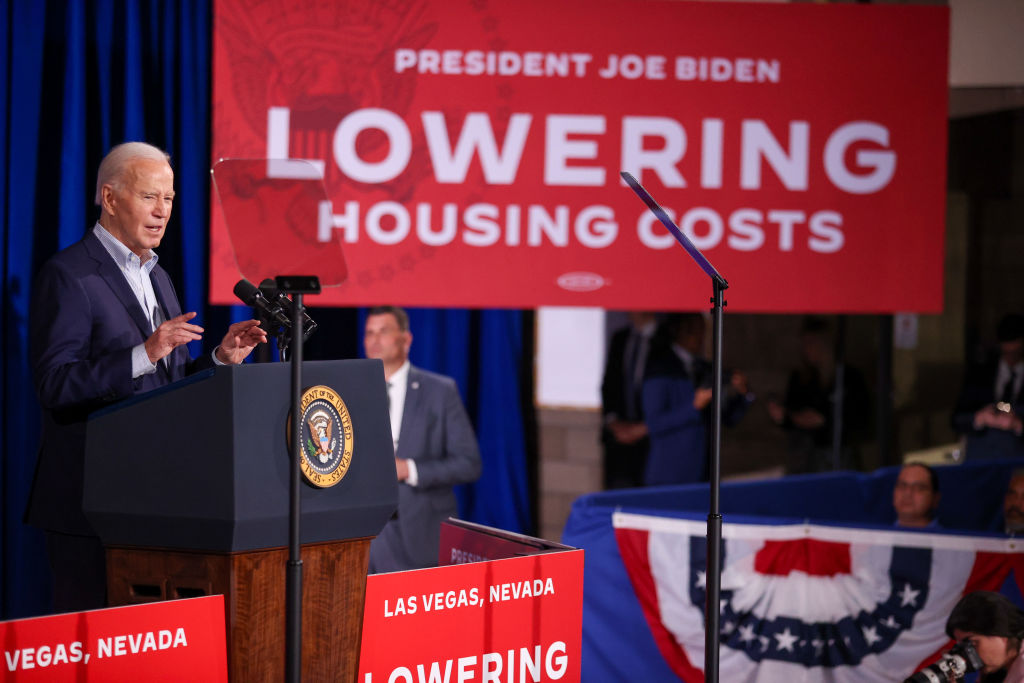

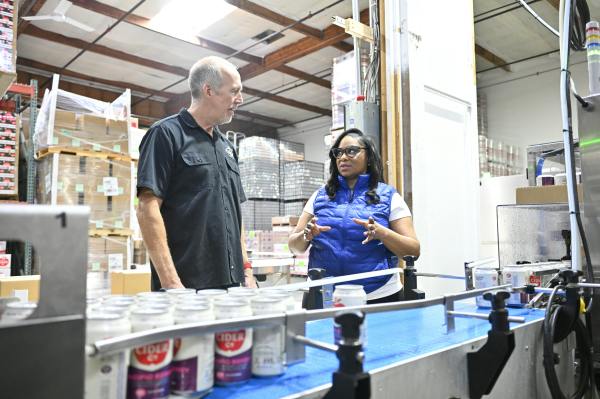
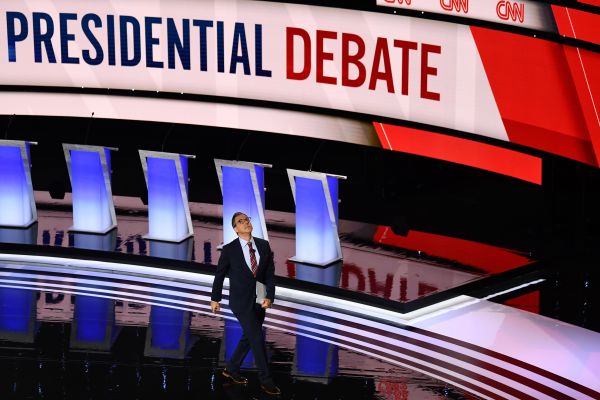
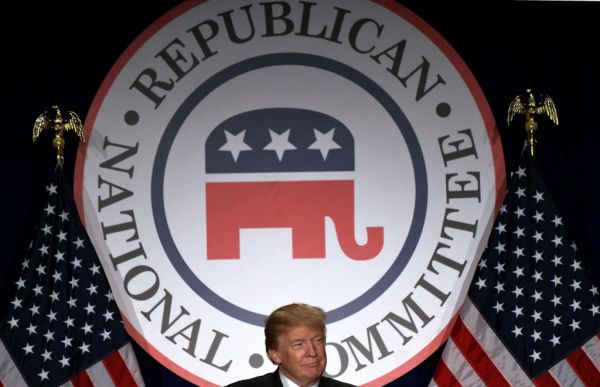

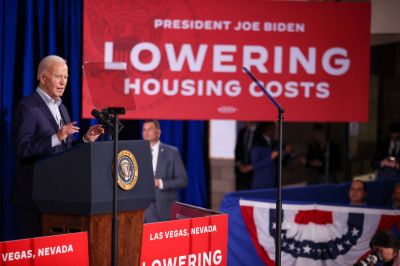
Please note that we at The Dispatch hold ourselves, our work, and our commenters to a higher standard than other places on the internet. We welcome comments that foster genuine debate or discussion—including comments critical of us or our work—but responses that include ad hominem attacks on fellow Dispatch members or are intended to stoke fear and anger may be moderated.
With your membership, you only have the ability to comment on The Morning Dispatch articles. Consider upgrading to join the conversation everywhere.